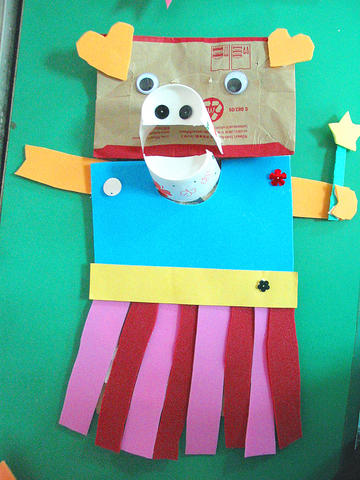The 16th Taipei International Book Fair is getting off to an early start this year with a preview at Huashan Arts District (華山藝文特區) tomorrow and Sunday.
The Huashan event, the goal of which is to make the fair more mainstream, is aimed particularly at children who might find the "literary" activities of the main fair overwhelming.
For the children, activities are not limited to reading. Most take the skills and materials used in the production of books and present them in an interactive, fun fashion.

PHOTO COURTESY OF TAIPEI BOOK FAIR FOUNDATION
The Puppet and Its Double Puppet Theater (無獨有偶) will be on hand to show how simple tools can be used creatively. Wang Kou-chiang (王冠強) of the National Guoguang Chinese Opera Company (國立國光劇團) will lead a session on painting Chinese opera face masks. Huang Pei-ying (黃沛瀅) of the Fang Tien Workshop (方田工作室) will teach attendees to make photo frames from corrugated paper. Other sessions include binding books by hand (led by Chang Ming-liang, 張名良, of the Taiwan Handicraft Development Association, 台灣工藝協會) and making red envelopes (taught by Chen Xun, 陳詢, of the Su Ho Memorial Paper Museum, 樹火紙博館).
But these are just the tip of the iceberg. Around 20 stalls, run by vendors with publishing or arts connections, are expected. Some are local publishers of children's books, others will be selling works by artists in wood block printing, etching and illustrating as well as other items related to literacy.
Having this prelude is just one step designed to make the affair appealing to the general public. Last year's event, with a Russian theme, was overtly intellectual. This year the focus is on Australia and the highlight will be a visit from Tony and Maureen Wheeler, of Lonely Planet fame, at 2pm on Feb. 17.
The main activity open to the general public starts on Feb. 14. (The first day, Feb. 13, is only for industry professionals and those with disabilities.)

June 9 to June 15 A photo of two men riding trendy high-wheel Penny-Farthing bicycles past a Qing Dynasty gate aptly captures the essence of Taipei in 1897 — a newly colonized city on the cusp of great change. The Japanese began making significant modifications to the cityscape in 1899, tearing down Qing-era structures, widening boulevards and installing Western-style infrastructure and buildings. The photographer, Minosuke Imamura, only spent a year in Taiwan as a cartographer for the governor-general’s office, but he left behind a treasure trove of 130 images showing life at the onset of Japanese rule, spanning July 1897 to

One of the most important gripes that Taiwanese have about the Democratic Progressive Party (DPP) is that it has failed to deliver concretely on higher wages, housing prices and other bread-and-butter issues. The parallel complaint is that the DPP cares only about glamor issues, such as removing markers of Chinese Nationalist Party (KMT) colonialism by renaming them, or what the KMT codes as “de-Sinification.” Once again, as a critical election looms, the DPP is presenting evidence for that charge. The KMT was quick to jump on the recent proposal of the Ministry of the Interior (MOI) to rename roads that symbolize

On the evening of June 1, Control Yuan Secretary-General Lee Chun-yi (李俊俋) apologized and resigned in disgrace. His crime was instructing his driver to use a Control Yuan vehicle to transport his dog to a pet grooming salon. The Control Yuan is the government branch that investigates, audits and impeaches government officials for, among other things, misuse of government funds, so his misuse of a government vehicle was highly inappropriate. If this story were told to anyone living in the golden era of swaggering gangsters, flashy nouveau riche businessmen, and corrupt “black gold” politics of the 1980s and 1990s, they would have laughed.

In an interview posted online by United Daily News (UDN) on May 26, current Chinese Nationalist Party (KMT) Chairman Eric Chu (朱立倫) was asked about Taichung Mayor Lu Shiow-yen (盧秀燕) replacing him as party chair. Though not yet officially running, by the customs of Taiwan politics, Lu has been signalling she is both running for party chair and to be the party’s 2028 presidential candidate. She told an international media outlet that she was considering a run. She also gave a speech in Keelung on national priorities and foreign affairs. For details, see the May 23 edition of this column,